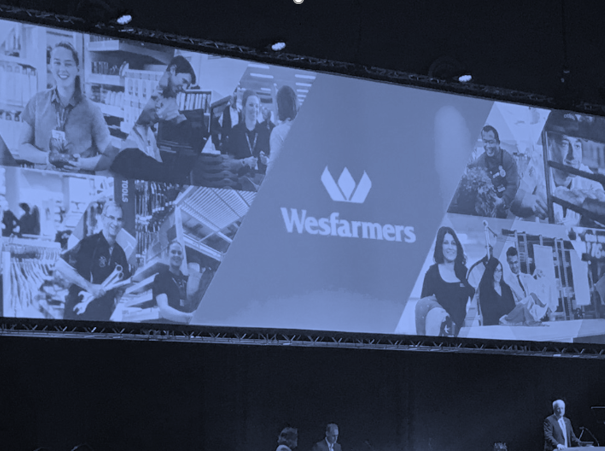The Wesfarmer’s AGM has always had a liberal dose of royal show about it. The mum and dad (and increasingly grandmum and granddad) shareholders lap up the Coles sausage rolls, the Blackwoods chocolate toolkit and the Bunnings showbag as much as the chance to gain confidence over the stewardship of their investment. For me, the attraction was to see how Wesfarmer’s modus operandi is performing since the Financial Services Royal Commission plonked a dirty great corporate citizenship elephant into the Board rooms of all large ASX listed corporates and to see what has changed since 2016 – original post here – (though those sausage rolls were tasty).
Chairman Chaney did not waste any time taking the elephant by the tusks. He started his address by calling out the obsessive focus of analysts and financial commentators on short term profit. He noted that the continual commentary on the likelihood of corporates to meet “consensus forecasts” can influence management to bend the rules and he believed this was underlying reason behind the sins uncovered by the Royal Commission.
But don’t misinterpret this sentiment that profits are bad. Chaney stated that long term returns were the focus for WES. Wesfarmers was once a farmer cooperative and since 1984, has provided returns ten times better than an equivalent investment into the ASX (indexed) over the same time. That is, long-term profit drivers are good, short-term profit drivers bad, and if you are any doubt – look at the scoreboard!
The Royal Commission elephant, like the beast itself, is replete in shades of grey. Commentators have been musing throughout as to whether a focus on financial returns is mutually exclusive from being a good corporate citizen. The current Chair of NAB, Ken Henry (a role Chaney once held), stated in his time on the Royal Commission stand that he believed that a Board’s accountability should maybe be to more than just shareholders, but the community as a whole, and perhaps even the country (but presumably not New Zealand – where subsidiary BNZ has 15% of the market).
To this sentiment, Chaney pulled out his black and white colour palette and started liberally painting zebra stripes over this grey thought bubbling. He emphatically stated that to make good long term returns an organisation like Wesfarmers MUST be a good corporate citizen. It is a condition to existence, the licence to operate – but the primary objective is to make financial returns. If not, shareholders will invest somewhere they will.
Recently minted MD Rob Scott took to the lectern and continued the theme. Anyone who has anything to do with Wesfarmers knows their purpose is to provide a satisfactory return to their shareholders. This has always been clear. Although satisfactory, in the common vernacular, is often used to describe something unexceptional, in the literal sense, satisfactory is relative to whoever is defining it. For example, a satisfactory income for a Russian Oligarch is significantly different from the satisfactory income for a 15 year old babysitter. Rob Scott eschewed the ambiguity of satisfactory and defined it as “superior to the market” on multiple occasions. Wesfarmers doesn’t just exist to make long term financial returns, they must be better than others.
Scott used terms such as “shared value” when elaborating on what comprises good citizenship. He mentioned that his staff want “to make a difference” when they work for Wesfarmers. So how do they make a difference? Scott explained this simply – through Wesfarmers’ contribution to taxes, community support (ie philanthropy) and employment. The meat and two veg of corporate responsibility.
Wesfarmers used to serve a more socialistic purpose – it was a cooperative for 70 of its 104 year existence – and it is perhaps this history that sharpens their view. Its customers were its members and that was who they served. Over time, the cooperative needs lessened and Wesfarmers evolved into a commercial model that was better supported by a shareholder structure. Recognising this, members made a conscious decision to demutualise – a decision that is difficult to critique. Trying to morph altruism or community service back into a successful commercial organisation has the risk of splitting its purpose and serving neither well.
Wesfarmers has heard the disquiet echoing from the Royal Commission and said ‘we aren’t having it’. An elephant walked in to 2018 Wesfarmers AGM but a zebra walked out.
Mark Narustrang is Principal Consultant and Director of Pivotal Point Strategic Directions and skilled in helping Boards “remove the grey” form their strategic purpose.

